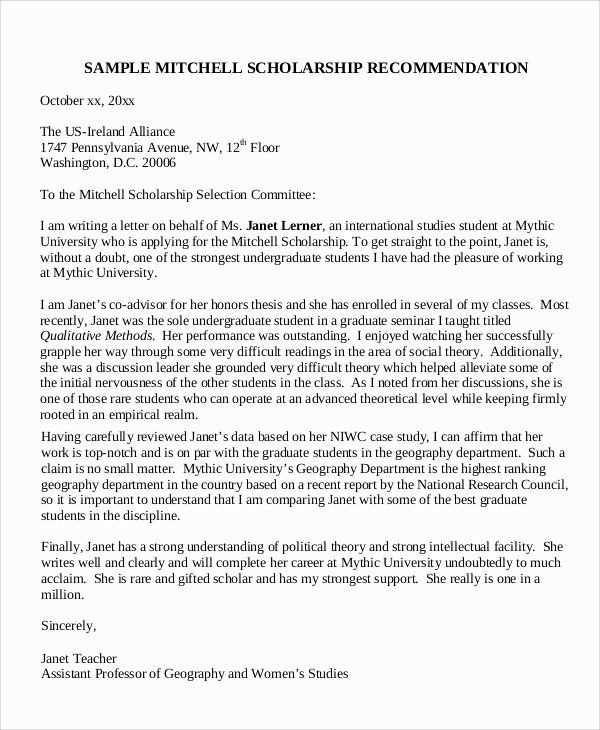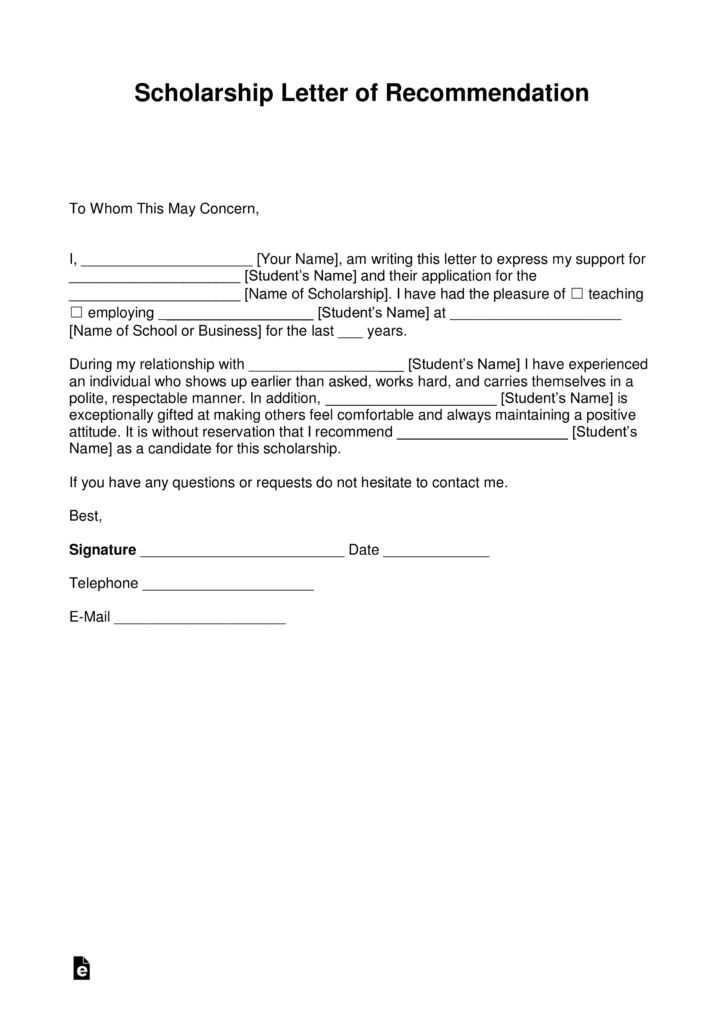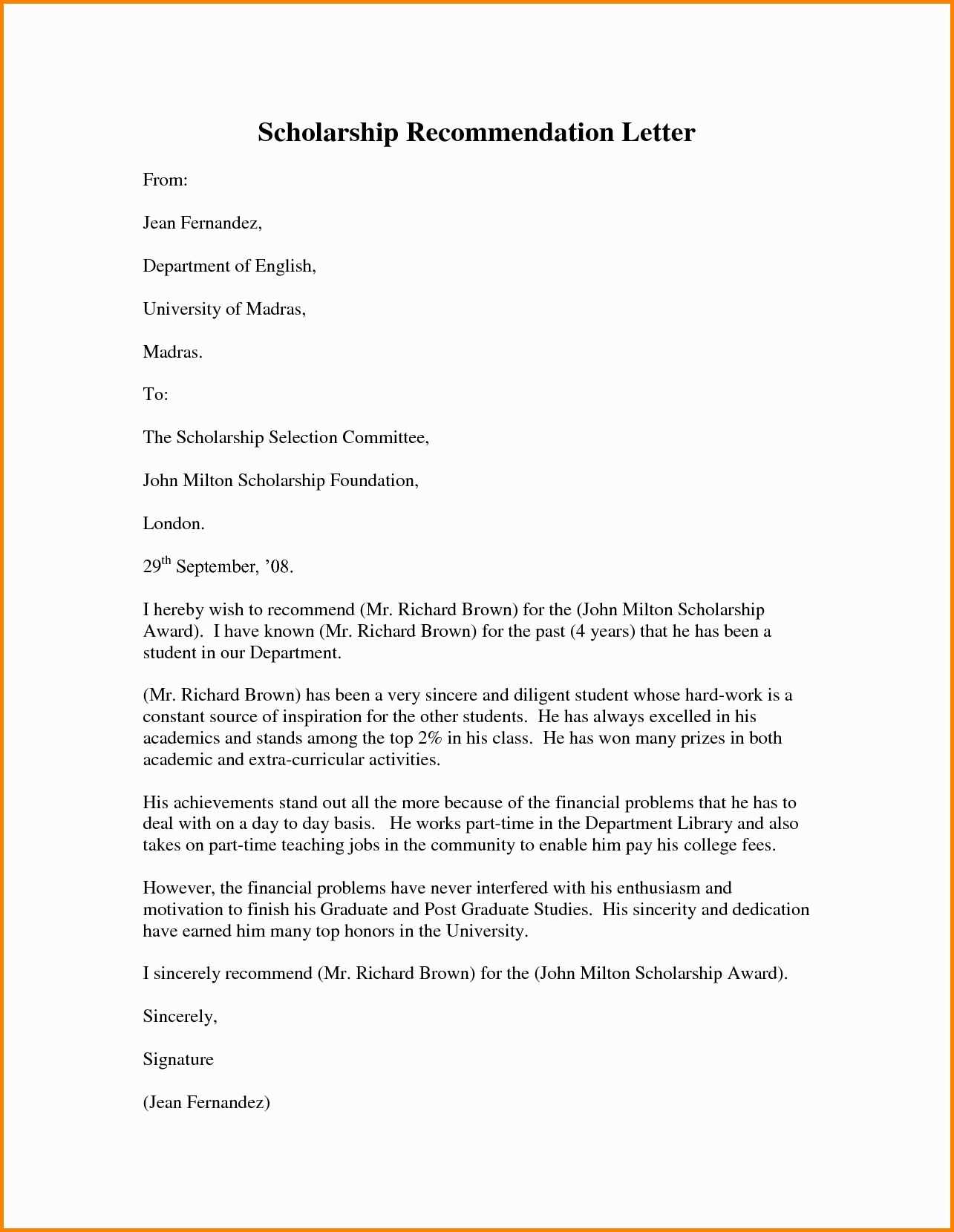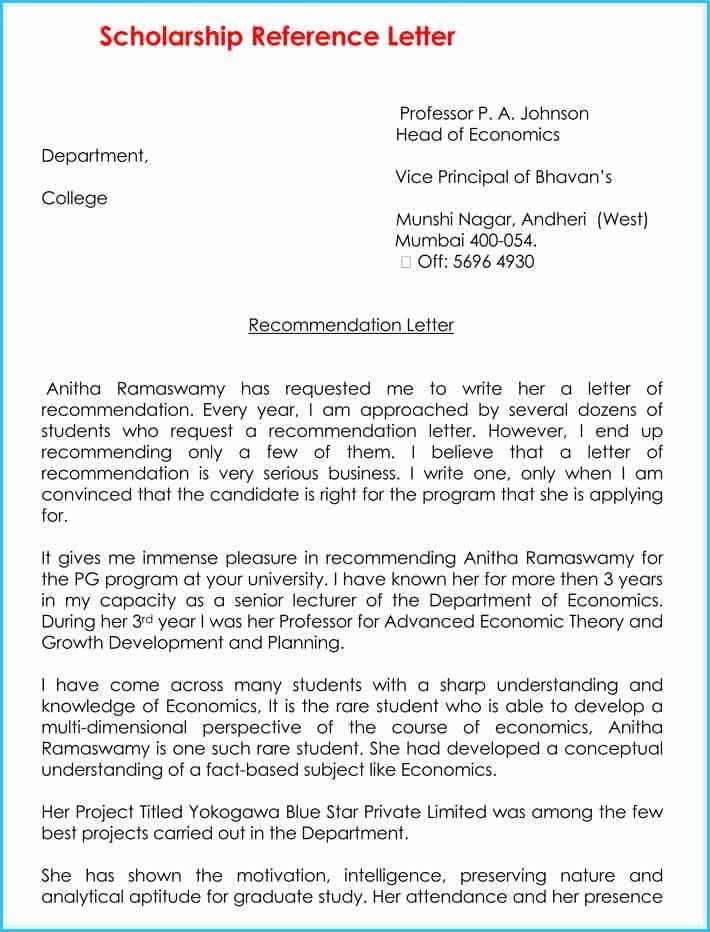Template for Scholarship Letter of Recommendation

When it comes to endorsing someone’s application for an educational opportunity, providing a well-structured and persuasive reference can make a significant impact. A thoughtful recommendation serves as a testament to the individual’s qualifications, character, and potential. By following a clear framework, you can craft a compelling statement that will highlight the strengths and achievements of the person you’re supporting.
In this guide, we will walk you through the essential components of a persuasive reference. Whether you’re writing a formal endorsement for a candidate’s academic pursuit or a professional opportunity, understanding how to convey the most relevant details is key. With careful attention to language and structure, your recommendation will be both effective and memorable.
How to Write a Strong Recommendation

Crafting a persuasive endorsement requires more than just listing achievements. It involves clearly presenting the applicant’s qualities, skills, and potential in a way that connects with the reader. An effective reference should not only highlight key attributes but also illustrate how these strengths make the individual a suitable candidate for the opportunity in question.
Begin by focusing on the person’s most relevant attributes. It’s essential to showcase their academic achievements, personal growth, and any specific traits that align with the goals of the program. Including concrete examples will make the endorsement more compelling and memorable. The strength of your endorsement often lies in the details that demonstrate the applicant’s impact, both personally and professionally.
Key Elements to Include
A well-rounded recommendation will touch upon several important elements:
| Component | Description |
|---|---|
| Introduction | Start with how you know the individual and in what context. |
| Qualifications | Discuss the applicant’s key accomplishments and attributes. |
| Personal Character | Provide insights into the person’s integrity, work ethic, and motivation. |
| Suitability | Explain why they are an ideal candidate for the opportunity. |
| Conclusion | Wrap up with a strong endorsement and your overall recommendation. |
Making the Endorsement Impactful
For your recommendation to stand out, it must reflect your genuine belief in the candidate’s abilities. Avoid vague statements and aim for specific, impactful details. A personalized, well-structured reference will resonate with decision-makers and can make a significant difference in the applicant’s success.
Key Elements of a Strong Endorsement
When composing a compelling endorsement, several crucial components must be included to ensure the message is clear and effective. These elements work together to present the candidate as an ideal fit for the opportunity, emphasizing their strengths and how they align with the program’s goals. Each section of the endorsement should build a cohesive narrative that showcases the individual’s achievements and character.
The first step is to establish the relationship with the applicant and your perspective on their qualifications. This serves as the foundation for the rest of the endorsement, providing context for your insights. Afterward, focus on specific traits, skills, and accomplishments that make the individual stand out. Providing tangible examples helps strengthen the overall message and makes it more relatable.
Finally, a strong endorsement should conclude with a clear statement of support, reinforcing your confidence in the candidate’s potential. Offering a personal endorsement with enthusiasm and authenticity can leave a lasting impression.
Understanding the Purpose of the Letter
Writing a persuasive endorsement is about conveying why the individual is deserving of the opportunity. The primary objective is to provide insight into the applicant’s abilities, character, and potential in a manner that helps decision-makers assess their suitability. This type of correspondence aims to present a candidate as someone who can excel in the position or program they are applying for, demonstrating that they have the necessary qualities to succeed.
Building Trust and Credibility
One of the most important aspects of a strong endorsement is building trust with the reader. The person writing the endorsement should be seen as credible, having sufficient knowledge of the applicant’s qualifications and character. Providing specific examples of achievements, personal traits, and contributions will help to establish this trust.
Highlighting Key Attributes
The focus of the endorsement should be on the qualities and experiences that make the individual an outstanding candidate. Rather than merely listing attributes, it’s crucial to connect them to the context of the opportunity. By doing so, the writer helps the reader understand not just what the person has done, but why those actions make them a suitable match for the opportunity in question.
Common Mistakes to Avoid in Letters
When crafting a formal endorsement, it is essential to be mindful of certain errors that can undermine its effectiveness. These pitfalls can easily occur, especially when the tone, content, or structure is not properly aligned with the purpose of the endorsement. Understanding what to avoid can ensure that the final communication has the desired impact.
Unclear or Vague Statements

Avoid making statements that lack specificity or are too general. Clear and concrete examples of the individual’s skills and achievements provide more credibility and weight to the support being offered.
- Using phrases like “the candidate is good at their job” without detailing any particular strengths or accomplishments.
- Making broad claims without explaining how the person demonstrated the skills in question.
Overly Personal or Informal Tone
It is crucial to maintain professionalism throughout the endorsement. An overly casual or personal tone can give the wrong impression and may reduce the perceived value of the recommendation.
- Using overly familiar language such as nicknames or personal anecdotes that are irrelevant to the qualifications.
- Including inappropriate humor or off-topic remarks that detract from the focus of the endorsement.
Customizing Your Template for Each Applicant

Adapting your endorsement to reflect the unique qualities and achievements of each individual is essential. A generic approach will not effectively convey the candidate’s distinct strengths and contributions. Tailoring the content ensures that the person’s specific qualifications and character traits are highlighted appropriately.
Focus on their particular skills, experiences, and attributes that align with the purpose of the endorsement. By incorporating these aspects, you create a more compelling and personalized message that resonates with the intended audience.